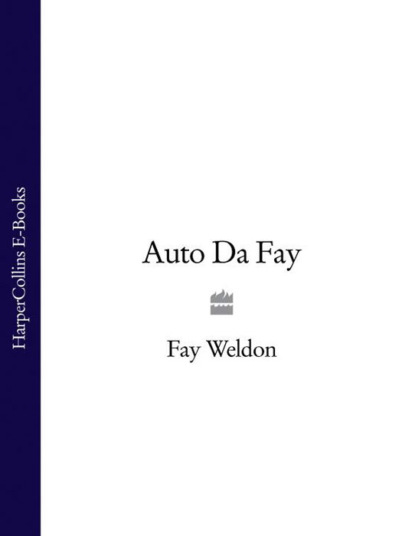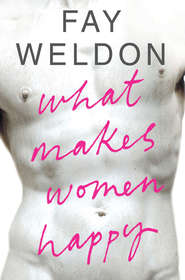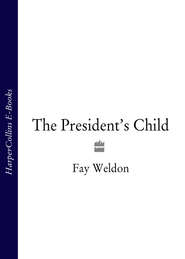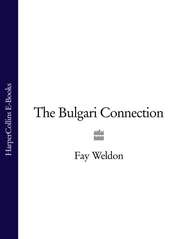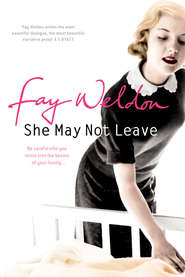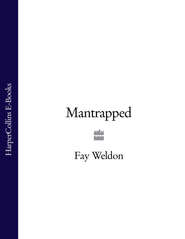По всем вопросам обращайтесь на: info@litportal.ru
(©) 2003-2024.
✖
Auto Da Fay
Настройки чтения
Размер шрифта
Высота строк
Поля
Pregnant (#litres_trial_promo)
Flight (#litres_trial_promo)
Fay Davies (#litres_trial_promo)
New Mothers (#litres_trial_promo)
Haunted (#litres_trial_promo)
Out of the Frying-pan (#litres_trial_promo)
Davies/Bateman (#litres_trial_promo)
Mrs Bateman (#litres_trial_promo)
Sent Out (#litres_trial_promo)
Running Away (#litres_trial_promo)
Fay Bateman (#litres_trial_promo)
Hopeless in Love (#litres_trial_promo)
Work Among the Poets (#litres_trial_promo)
Juggling (#litres_trial_promo)
Stepping Over the Cook (#litres_trial_promo)
Doubt and Destiny (#litres_trial_promo)
Love at First Sight (#litres_trial_promo)
At Sea (#litres_trial_promo)
Moving In (#litres_trial_promo)
A Career is Born (#litres_trial_promo)
Change (#litres_trial_promo)
Clutter (#litres_trial_promo)
Making Good (#litres_trial_promo)
Fay Weldon (#litres_trial_promo)
Fay Weldon (#litres_trial_promo)
From the reviews for Auto Da Fay: (#litres_trial_promo)
By the same author (#litres_trial_promo)
Copyright (#litres_trial_promo)
About the Publisher (#litres_trial_promo)
Pre-name (#ulink_9c14d3f7-23df-516e-8103-da08a4e9c4f5)
I long for a day of judgment when the plot lines of our lives will be neatly tied, and all puzzles explained, and the meaning of events made clear. We take to fiction, I suppose, because no such thing is going to happen, and at least on the printed page we can observe beginnings, middles and ends, and can find out where morality resides. Real life tends to fade out into entropy, all loose ends, and grief for what should have been, could have been, had things turned out just a little differently. Yet probably the life that was lived was the best that could be done: even, to the outsider, better than could have been expected.
This is an attempt to narrate a real life, my own, and to find the pattern within it. The pattern can’t really be completed, of course, until death, when autobiography so rudely turns into biography, but so far as I can do it, I will.
There seems to be a general overall pattern in most lives, that nothing happens, and nothing happens, and then all of a sudden everything happens. You are swimming out to sea, you’re rocking gently in the wake of a wave, all seems tranquil, but water is mounting beneath you, unstoppable, and suddenly you are the wave, breaking and crashing, sucking back into a maelstrom – and then all is tranquil again.
When I was three months in the womb, in a period no doubt of nothing happening and nothing happening except a general warm all-pervasive dullness, an earthquake in Napier, New Zealand, had my mother Margaret running from the house with my two-year-old sister Jane in her arms. The year was 1931. My mother was twenty-three. Our house stayed upright but the grammar school opposite and the hospital down the road, both made of brick and not New Zealand’s usual wood, collapsed. Everything else seemed made of matchsticks. My mother, in search of my father, one of the town’s few doctors, ran past the grammar school and saw arms and legs sticking out of the rubble. But with a small child in your arms, what can you do for others? Everyone else was running too, some one way, some another: the ground was still shaking and changing and whether you were running into more danger or less how could you be sure? But still she ran.
All the water swept out of Napier harbour that day and never came back: the town had to be entirely rebuilt, and became the Art Deco gem it is today.
Dr Frank Birkinshaw, my father, was too busy with the injured to take care of his young wife. He was a man of great charm, tall, well built, blue-eyed, adventurous and impetuous – at the time in his mid-thirties. Margaret was small, dark, fastidious and very, very pretty, with high cheekbones, big brown eyes and a gentle manner. The Birkinshaws were recent immigrants from England. He was from the North, had joined the army when he was sixteen, been invalided out of the trenches, and qualified as a doctor in the face of many obstacles. She was a bohemian from the softer South, an intellectual by birth, breeding, and temperament: her father a novelist, her mother a musician. She kept the company of Evelyn Waugh and his gang of friends, she was at home in literary soirées and in fashionable nightclubs, not in this harsh pioneering land. But she was also clever, determined and tough and failing to find my father, she left word for him, and by nightfall she and Jane had taken refuge in the tented city that went up overnight on the hills above Napier. The town was uninhabitable.
The stars had never seemed so bright, my mother said, as if nature were showing off its beauty to make amends for the terrible thing it had just done. But the lice, she added, were very active. I have met others who mention these two things about the tented town, the brightness of the stars and the liveliness of the lice. And they smile and seem to prefer not to go into detail. Perhaps licentiousness reigned: it would not be surprising; the ordinary answer to death is to create new life, and the normal inhibitions of small town life had been suddenly and drastically removed.
My mother was rescued from her makeshift tent by a sheep farmer and his wife, grateful patients of my father. They took her and little Jane to their homestead, where there was, my mother said, mutton for breakfast, mutton for dinner and mutton for tea. She helped around the farm, and cooked and ate the mutton with gratitude. I inherit this gift from her, I daresay, in that I do what is under my nose to be done, without too much lamentation.
Although the ground shook and trembled for weeks after the initial quake, meals continued to be served in the cookhouse, which had a tall brick chimney. My mother lived in fear of it collapsing and killing everyone inside, but no one would listen to her. She was dismissed as an alarmist. She was right, of course. There was another bad shock. ‘I felt the trembling begin beneath my feet. I snatched Jane from her cot on the veranda and ran for open space but I was flung to the ground by what seemed a wave of dry land. I saw the hedge flick first one way and then the other. And then I watched the chimney fall into the cookhouse and destroy it. I always knew it would. I had already seen it happen.’ As it fell out, dinner had finished just minutes before, and no one was killed, though for a time meals had to be eaten in the open air.
I have not inherited my mother’s gift for prophecy: true, as you grow older you may begin to know what is going to happen next, but this can be put down to experience, not second sight. It is not a happy gift to have: because of it, for one thing, my mother never learned to drive, seeing too many scenarios of disaster ahead for comfort, too conscious of what might be going on over the brow of the hill. My father was very different: he was over-confident: he saw to the pleasures of the here-and-now and let the future go hang. I was born more like him than her, in this respect. She prophesied that it would land us both in trouble, and she was right.
There was no word from Frank for three months. My mother became alarmed. He knew where she was. It was true that, post-earthquake, communications were near-impossible: civil structures had broken down, there was no working telephone system for a time and no post – but surely in three months he could have managed some kind of message? Perhaps in the second big shock the earth had swallowed him up? Perhaps he’d run off with another woman? Women were always after him. Perhaps he had amnesia, and didn’t remember he was married? Or perhaps this was just the way men were? She had no friends of her own age to talk to. The Birkinshaws had not been long in Napier: she’d been too busy adjusting to pioneer manners to make friends: in London people left calling-cards in the front hall: not here, where luxuries like hall-stands were rare.
The truth was hard to avoid: that here she was alone, penniless, on the wrong side of the globe, with no past, no future, just the shaky earth beneath her feet and two children, one born, one yet unborn, and no one to look after them but herself. Pregnant, she must for the time being be dependent upon the comfort of strangers. But once I was born, somehow, she would get us back to London. There were advantages to having no husband – at least you could make your own decisions. In the meanwhile she had better make herself useful and help in the kitchens and try to hold her tongue when her hosts started rebuilding the cookhouse chimney just where it had been before. It did not do for ‘homies’ – immigrants – to put on airs or offer advice.
She made mutton stew for the farmhands. Trim and cut the meat, brown in beef dripping – better than mutton fat – add onions and carrots, stew till the meat is on the point of disintegration, thicken with flour and serve. She learned to make the basic cake which accompanied my childhood. The weight of an egg in sugar, the same in butter, a cup of liquid, a cup of flour, and never close the oven with a bang or it sinks. This is the same sensible basic cake which she now has every evening for supper in her retirement home seventy years on. Sometimes, for variety, they put sultanas in it, sometimes not. She looks at it and shakes her head. How can they make something which ought to be so light, so solid?
She would write home, of course, though it hurt her pride. Margaret had married, at nineteen, in the face of a great deal of advice to the contrary. A letter could go no faster than the ship which carried it: five or six weeks to get to London – via Panama or Suez – and the same for a reply to come back, and supposing Frank turned up in the meantime? Her parents would send her money if they could, but supposing they couldn’t, all she would succeed in doing was worry them. Because back home in London, needing no earthquake to achieve it, or only those of the emotional kind, the Jepson family too had collapsed in disarray.
Her father Edgar, at the age of sixty-nine, had made his mistress Lois pregnant. Her mother Frieda, unable to bear it any longer, had fled the marital home and gone to be with her own mother, Mary Francis Holmes, widowed and in San Francisco. Frieda, now in her early fifties, had no income of her own and lived by her mother’s courtesy, and anything Edgar could afford. It was not much. Edgar was a prolific writer: he wrote seventy-three novels in all – light but popular: Lady Noggs Assists, The Reluctant Footman, The Cuirass of Diamonds and so on – but hard as he worked, his age was beginning to tell against him, public taste was changing, and the financial depression of the times affected everyone. Now he must do the decent thing and marry Lois, and he would have another child to keep.
Nor could there be any support, either financial or moral, from my mother’s elder sister Faith, whom Margaret had loved dearly and greatly depended upon during her childhood. Faith had gone ‘mad’, and was now locked up in the lunatic asylum where she was to live out the rest of her short days. Only their big brother Selwyn, then a fashionable young man about town, already making a good living selling articles and short stories, was prosperous enough to offer any help. But it seemed doubtful that he would. He had been very much against Margaret marrying Frank and it was his general principle that if people made their own beds, they should lie in them.
I have a photograph of Selwyn at this period. A wraith of cigarette smoke curls from an elegant ivory holder. He does not look the kind of young man to see earthquakes as an excuse for failure. In the Second World War he was to become a major in the SOE, in charge of recruitment, his task to find and send agents to a likely death in occupied France. I think he became kinder then: certainly he was to develop an air of benign consideration, and to be of great help to us, until my mother quarrelled with him over a matter of principle. But as it was, my mother chose to write to Edgar.
No sooner had she done so, of course, than through the post came a letter from Frank. He was apologetic: he had been looking for work and hadn’t liked to write until he had something good to report. Now he had. This was the Thirties, the depression had hit New Zealand badly: there was massive unemployment, and the professions were not immune. But he had finally found a job as houseman in the hospital at Palmerston North, a township further inland. True, it was a live-in job, there were no married quarters, and he had had to pretend he was single, but he had found her and Jane lodgings in a nearby boarding-house.
My poor mother: out of the frying-pan into the fire. She had her husband back, at least when he could slip out unnoticed from the hospital, and all the energy and exhilaration that accompanied his presence, but it wasn’t enough. She was lonely, traumatized, uncomfortable because I kicked a lot, unable to sleep at night because of the trains which in those days ran through the middle of the town, Jane’s crying and the landlady’s suspicions about her respectability. When a letter finally arrived from Edgar telling her to come back home, no matter what, and enclosing money for the fare, she took ship back to England.
She did not stay in London because now Lois was installed in the family home as Edgar’s new wife, and Margaret saw it as an act of disloyalty to her mother to stay there. It would upset Frieda too much when she heard of it, which she would undoubtedly do. Instead my mother went to Frank’s parents, Herbert and Isabel Birkinshaw, then living in Barnt Green, outside Birmingham. And that’s how I happened to be born, on 22 September, 1931, in a nursing home in the village of Alvechurch, Worcestershire, and not in Napier, New Zealand, as everyone had expected.





